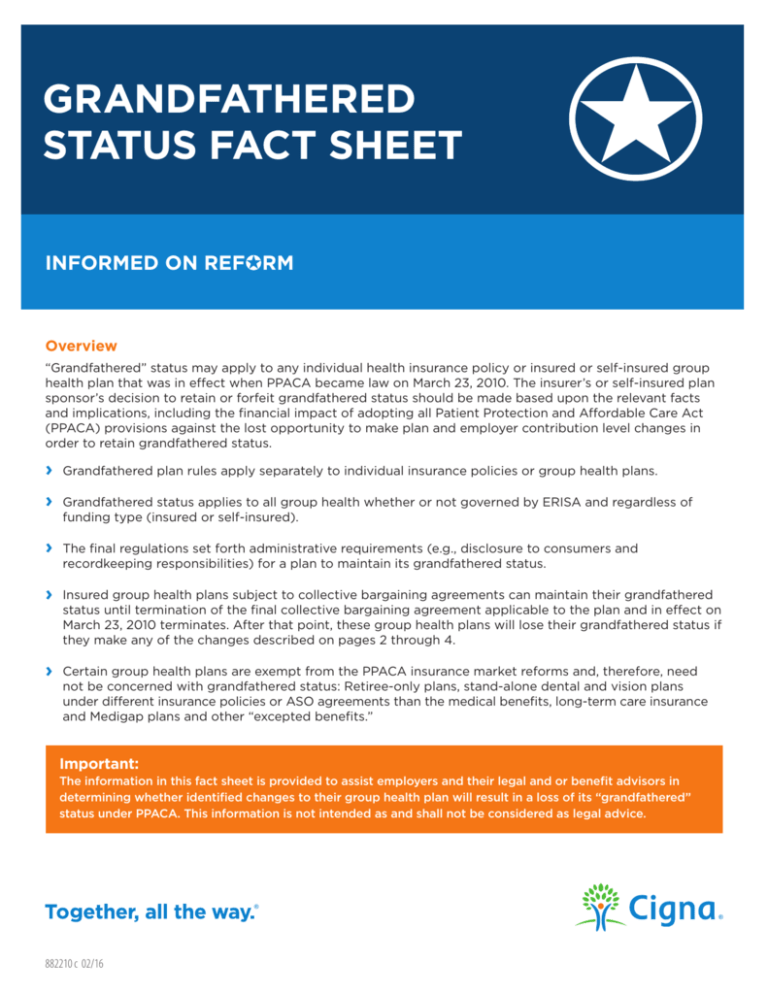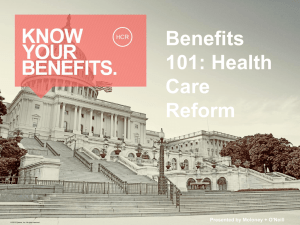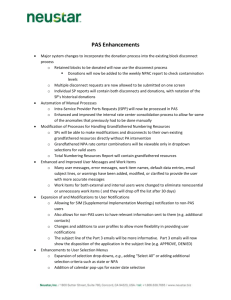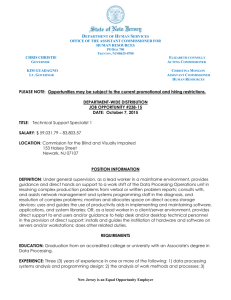grandfathered status fact sheet
advertisement

GRANDFATHERED STATUS FACT SHEET INFORMED ON REFORM Overview “Grandfathered” status may apply to any individual health insurance policy or insured or self-insured group health plan that was in effect when PPACA became law on March 23, 2010. The insurer’s or self-insured plan sponsor’s decision to retain or forfeit grandfathered status should be made based upon the relevant facts and implications, including the financial impact of adopting all Patient Protection and Affordable Care Act (PPACA) provisions against the lost opportunity to make plan and employer contribution level changes in order to retain grandfathered status. › Grandfathered plan rules apply separately to individual insurance policies or group health plans. › G randfathered status applies to all group health whether or not governed by ERISA and regardless of funding type (insured or self-insured). › T he final regulations set forth administrative requirements (e.g., disclosure to consumers and recordkeeping responsibilities) for a plan to maintain its grandfathered status. › Insured group health plans subject to collective bargaining agreements can maintain their grandfathered status until termination of the final collective bargaining agreement applicable to the plan and in effect on March 23, 2010 terminates. After that point, these group health plans will lose their grandfathered status if they make any of the changes described on pages 2 through 4. › C ertain group health plans are exempt from the PPACA insurance market reforms and, therefore, need not be concerned with grandfathered status: Retiree-only plans, stand-alone dental and vision plans under different insurance policies or ASO agreements than the medical benefits, long-term care insurance and Medigap plans and other “excepted benefits.” Important: The information in this fact sheet is provided to assist employers and their legal and or benefit advisors in determining whether identified changes to their group health plan will result in a loss of its “grandfathered” status under PPACA. This information is not intended as and shall not be considered as legal advice. 882210 c 02/16 Changes that trigger a loss of grandfathered status All changes must be compared to the plan that was in effect on 3/23/2010. This comparison must be made annually and whenever there is a change in benefits or employer contribution level. Triggers requiring a calculation The following section includes a calculation that references the medical inflation factor. ›The medical inflation factor as of December 2015 is 16.51%. The calculation is based upon the Consumer Price Index (CPI) for the “SAM Medical Care” category from March 2010 and is updated quarterly. ›15% is the amount identified by HHS and is a cumulative percentage. ›15% is added to the medical inflation factor of 16.51% to determine the cumulative percentage of 31.51%. ›If a plan changes a copay, deductible, or out-of-pocket maximum between March 23, 2010 and today and the amount is in excess of 31.51%, it will lose grandfathered status. Loss of Status Triggers Rules Examples Significantly increase copays • Addition of a new copayment Adding a copay not in effect on 3/23/10 will cause loss of grandfathered status. • Increase in an existing (3/23/10) copayment by more than the greater of: (A) $5, or (B) a percent equal to medical inflation +15% Significantly increase deductibles or out-of-pocket maximums Increasing an individual and/or family deductible or out-of-pocket maximum by an amount that exceeds medical inflation + 15% of the level in effect on 3/23/10. Changing a copay from $5 to $15 will cause loss of grandfathered status because it exceeds medical inflation + 15%. Applies to all types of copays including PCP, Specialist, Emergency Room, Urgent Care, Inpatient Hospitalization, etc. Changing an individual deductible from $500 to $1,000 will cause loss of grandfathered status because it exceeds medical inflation + 15%. Calculation example: $500 deductible Medical inflation factor of 16.51% + 15% identified by HHS = 31.51% cumulative percentage $500 x 1.3151 = $657.55 If the deductible changes to an amount greater than $657.55, grandfathered status will be lost. 2 Changes that trigger a loss of grandfathered status All changes must be compared to the plan that was in effect on 3/23/2010. This comparison must be made annually and whenever there is a change in benefits or employer contribution level. Loss of Status Triggers Rules Examples Increase percentage costsharing such as coinsurance A plan or policy cannot add or increase any percentage cost-sharing Changing a plan coinsurance level from 90% requirement (e.g., coinsurance) above the percentage in effect on in-network/70% out-of-network to 80% 3/23/10. in-network/60% out-of-network. Eliminating or reducing benefits A plan or policy cannot eliminate or significantly reduce all benefits for the diagnosis or treatment of a particular condition. Lowering level of employer contribution toward the cost of coverage A decrease in an employer’s contribution rate by more than 5% from On 3/23/10 the employer contributed 50% the contribution level on 3/23/10. of the cost of coverage. If the employer The 5% contribution cap is a cumulative percentage. Once the 5% subsequently decreases its level of contribution to the cost of coverage by more decrease is reached, the plan’s grandfathered status is lost. than 5%, grandfathered status is lost. Changes in annual limits If the policy or group health plan did not have an overall lifetime or annual limit for all benefits on 3/23/10, imposing an annual limit triggers loss of grandfathered status. Plan had no annual/lifetime limit on 3/23/10. If an annual limit on all benefits is added thereafter, the plan loses grandfathered status. If the policy or group health plan had a lifetime limit but no annual limit for all benefits on 3/23/10, imposing an annual limit that is less than the lifetime limit triggers loss of grandfathered status. Plan had a lifetime limit, but no annual limit on 3/23/10. If an annual limit that is less than the lifetime limit is added, grandfathered status is lost. Elimination of all benefits for the diagnosis or treatment of conditions like cystic fibrosis, diabetes, HIV/AIDS, etc. If the policy or group health plan had an annual limit for all benefits If plan had an annual limit on 3/23/10 on 3/23/10, any decrease in the annual limit will trigger loss of and the annual limit is thereafter reduced, grandfathered status. grandfathered status is lost. Mergers and acquisitions If the principal purpose of a merger, acquisition, or similar business restructuring is to cover new individuals under a grandfathered group health plan, that plan loses its grandfathered status. 3 Company A has a non-grandfathered group health plan. Company B has a grandfathered plan. A and B merge. If the principal purpose of the merger is to ensure that newly hired individuals will be covered only under Company B’s surviving group health plan, that plan loses its grandfathered status. Loss of Status Triggers Rules Examples Moving employees from one plan to another with lesser benefits Transferring employees who were covered under a group health plan on 3/23/10 to another plan that is grandfathered will cause the grandfathered plan to lose its grandfathered status if treating the grandfathered plan as an amendment of their prior plan has caused the prior plan to lose grandfathered status. Exception - if there is a bona fide employment-based reason for the transfer. Employer sponsors Plan A which had covered employees on 3/23/10. Employer also sponsors Plan B which is grandfathered. Employer transfers employees from Plan A to Plan B. Plan B will lose its grandfathered status if, for example, it imposes any copayments not imposed by Plan A or the employer’s contribution rate for Plan B is less than the contribution rate for Plan A on 3/23/10. If, however, in this same scenario, the reason the employer transferred employees from Plan A to Plan B is because Plan A was for employees working at a particular location and the employer closed that plant and allowed employees that moved to a different plant to be covered under Plan B for the employees at the other location, that would be a bona fide employment-based reason for the transfer and Plan B would not lose its grandfathered status. Provision of “grandfathering” statement Failure to include in plan materials provided to participants that describe benefits a notice that the plan is grandfathered (there is a model notice form) will trigger a loss of grandfathered status. Employer sponsors a grandfathered plan that was in effect on 3/23/10. The employer issues new benefit booklets to plan participants but fails to include the required “grandfathering” notice. As a result, the plan loses its grandfathered status. Scenarios related to state mandates that may impact grandfathered status Reduction of benefits On or before 3/23/10, a state required coverage of chiropractic services at 100% for 75 visits per year. If that state law is later repealed or expires and this level of coverage is no longer required, or if Cigna changes its interpretation so that coinsurance only needs to be at 80% for 50 visits per year, that is a reduction in benefits and may trigger loss of grandfathered status. If Cigna changes its interpretation that a law does not apply to a particular product, Multiple Employer Trust or Association, or is not extraterritorial, then it may trigger a loss of grandfathered status. 4 Changes that will not result in the loss of grandfathered status › A ddition of family members of an individual who is enrolled in a grandfathered plan and addition of new employees (whether newly hired or enrolled) in a grandfathered plan. › D isenrollment of one or more individuals enrolled on March 23, 2010 (provided that the plan or coverage has continuously covered someone since March 23, 2010). › Changes in premiums. › Changes required to conform to federal and state laws and regulations or state mandates. › Voluntary adoption of PPACA consumer protections. › Changing third-party administrators (TPAs). › C hanging carriers for an insured group plan (effective with 11/17/2010 amendment; if the change was made before 11/17/2010, grandfathered status was lost). › C hanging funding from self-funded to fully insured (effective with 11/17/2010 amendment; if the change was made before 11/17/2010, grandfathered status was lost). The Federal government has yet to clarify whether a change in prescription drug formulary or network will cause a loss in grandfathered status. All Cigna products and services are provided exclusively by or through operating subsidiaries of Cigna Corporation, including Cigna Health and Life Insurance Company, Connecticut General Life Insurance Company, Cigna Behavioral Health, Inc., and HMO or service company subsidiaries of Cigna Health Corporation. The Cigna name, logo, and other Cigna marks are owned by Cigna Intellectual Property, Inc. 882210 c 02/16 © 2016 Cigna. Some content provided under license.









